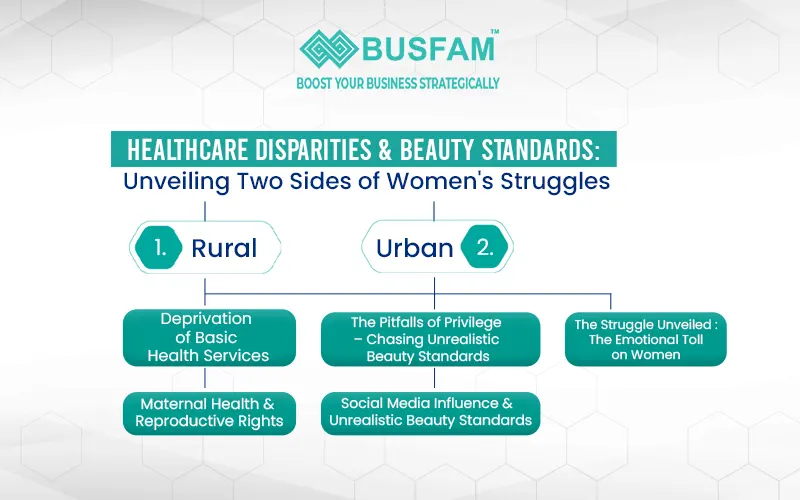Navigating Extremes: The Disparity in Women's Health in India
India's diverse landscape reveals contrasting stories in women's health. Some face hardships, lacking basic health checkups and medical care. On the flip side, a privileged group experiences advanced medical benefits but grapples with unrealistic beauty standards.
This divide highlights the extremes women in India endure, showcasing the nuanced challenges in both societal segments. From the harsh truth of deprivation to the entanglement in beauty ideals, women navigate distinct health struggles.
The disparities underscore the complexity of women's health in India, where varying circumstances paint a multifaceted picture of challenges and privileges.
Deprivation of Basic Health Services
In many pockets of India, women face a distressing dearth of basic health checkups and medical facilities. Rural areas, in particular, bear witness to a systemic failure where women are forced to navigate through life without the preventive measures that could safeguard their well-being. The lack of access to essential healthcare services perpetuates a cycle of neglect, leading to preventable diseases and complications.
- Maternal Health and Reproductive Rights
One of the most glaring gaps lies in maternal health and reproductive rights. Women in marginalised communities often lack proper prenatal care, leading to higher maternal mortality rates and complications during childbirth. The absence of family planning resources further exacerbates the challenges these women face, impacting not only their health but also the overall well-being of their families.
The Pitfalls of Privilege – Chasing Unrealistic Beauty Standards
Contrastingly, in urban areas, a different narrative unfolds. Here, women may have access to advanced medical facilities but find themselves ensnared in the web of unrealistic beauty standards. Influenced by a surge in social media exposure, these women are driven towards aesthetic procedures like fillers, botox, and collagen treatments to achieve an idealised version of beauty propagated by Western and Korean influences.
- Social Media Influence and Unrealistic Beauty Standards
The rise of social media has undeniably shaped the beauty ideals of contemporary society. Influencers, celebrities, and advertisements bombard women with images of flawless skin, sculpted bodies, and ageless faces. The pressure to conform to these standards has led many women to resort to extreme measures, often risking their health in the pursuit of an elusive perfection.
The Struggle Unveiled: The Emotional Toll on Women
Both sections of women, though at different ends of the spectrum, share a common thread of struggle and emotional distress. Women in rural areas grapple with the fear of undiagnosed illnesses, while those in urban settings navigate the emotional toll of conforming to societal beauty norms. The mental health repercussions are profound, showcasing the interconnectedness of physical and emotional well-being. Additionally, the issue of unequal pay in professional fields is another factor contributing to these challenges in both groups of women.

Conclusion: Bridging the Divide and Finding Solutions
The extremities faced by women in India demand a comprehensive and compassionate approach. Bridging the gap in access to basic healthcare services requires concerted efforts from policymakers, NGOs, and the healthcare industry. Initiatives that focus on rural healthcare infrastructure, awareness campaigns, and affordable healthcare services can contribute significantly to uplifting the health standards of marginalised women.
Simultaneously, addressing the unrealistic beauty standards perpetuated by social media necessitates a cultural shift. Education on body positivity, self-love, and the acceptance of diverse beauty is crucial. Influencers and media platforms can play a pivotal role in promoting a more inclusive definition of beauty, steering away from harmful practices that endanger women's health.
In conclusion, the extremities faced by women in India underscore the urgent need for a holistic and equitable approach to women's health. Only through collective action, awareness, and a recalibration of societal norms can we hope to create a healthier and more balanced environment for women across the nation.

